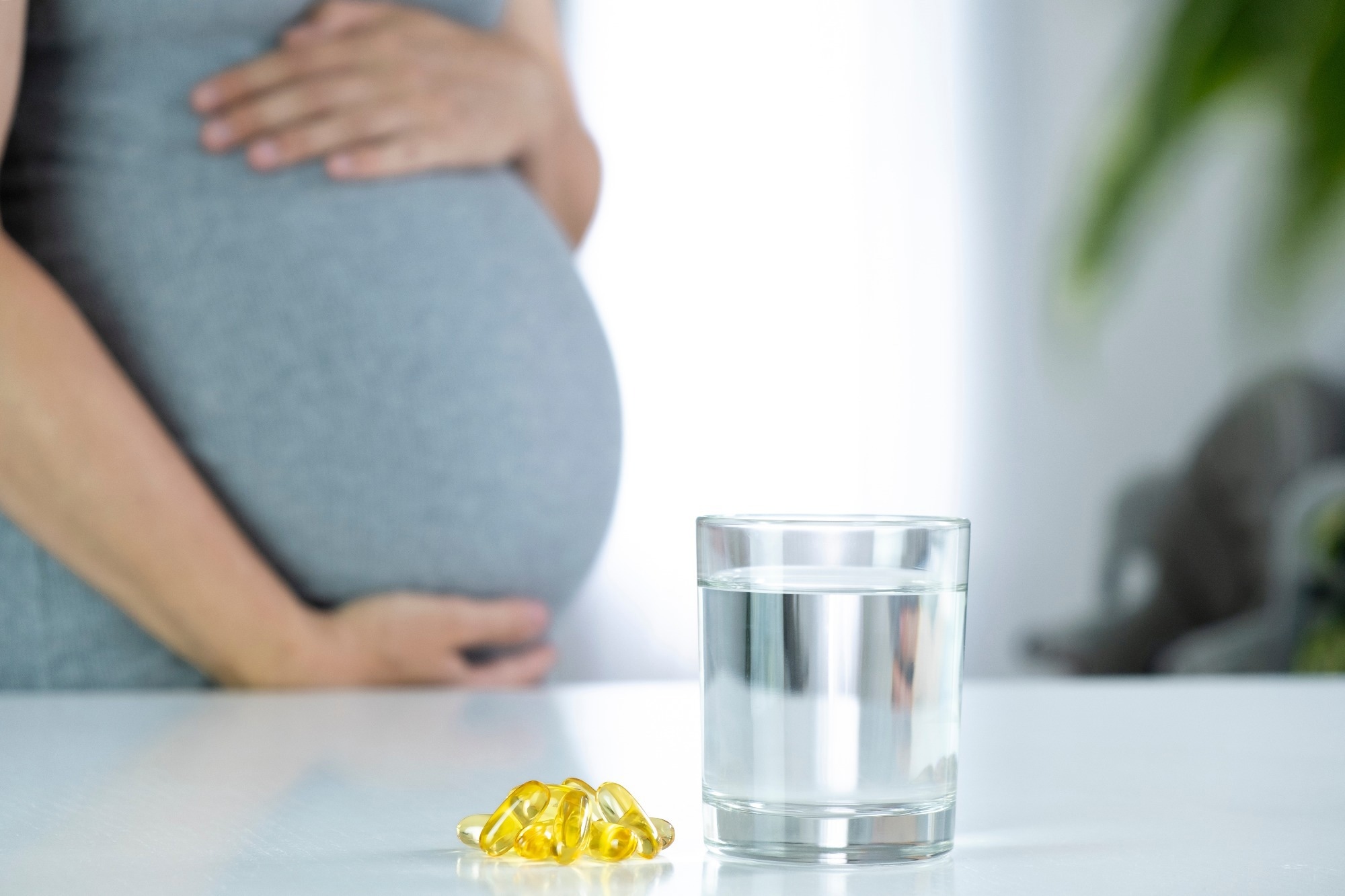In a recent study published in the journal Current Developments in Nutrition, researchers used a host of biochemical and body composition assays to investigate the associations between mother-consumed docosahexaenoic acid (DHA) supplements and offspring obesity outcomes. Specifically, they evaluated the effects of prenatal DHA supplementation on gestational weight gain (GWG) and adipose tissue distribution in offspring. Their study, titled the Growth and Adiposity in Newborns Study (GAINS; NCT 03310983), included 250 participants from the Assessment of DHA on Reducing Early Preterm Birth (ADORE; NCT 02626299) randomized controlled trial followed until 24 months following offspring birth.
Study findings reveal that prenatal DHA consumption significantly increases infant total- and central fat mass (FM) but does not alter GWG status. These effects were not affected by the observed offspring sex and persisted at 24 months of age, making this the third study highlighting the (beneficial) effects of prenatal supplements on offspring health outcomes. However, additional research and follow-up are required to ascertain whether these benefits persist throughout childhood.
 Study: The effect of prenatal DHA supplementation on offspring fat mass and distribution at 24 months old. Image Credit: Nemer-T / Shutterstock
Study: The effect of prenatal DHA supplementation on offspring fat mass and distribution at 24 months old. Image Credit: Nemer-T / Shutterstock
The danger of childhood obesity
Childhood obesity is often a severe medical condition characterized by significantly greater than-normal weights (body mass index [BMI] > 95th percentile for age) in children and adolescents. Alarmingly, the prevalence of the condition is on the rise, especially in developed countries such as the United States of America (US), necessitating research into the mechanistic underpinnings of the disease and ideal windows wherein clinical interventions might best combat the condition.
Recent research has suggested that the first 1,000 days following gestation represent one of these critical windows – herein, a rapid expansion in the abundance and size of adipocytes in infants is observed, substantially altering adipose tissue metrics at birth and during early life. Since fat-free infant mass is generally stable across individuals, this observed variance in adipose tissue governs measured weight outcomes. Parallel research has further highlighted the profound effects of neonatal excessive gestational weight (GWG) on the subsequent development of offspring obesity and its comorbidities (cardiovascular disease [CVD] and diabetes).
Prenatal supplementation has significantly improved offspring outcomes in unrelated medical research, suggesting its use in combatting childhood obesity. Polyunsaturated fatty acids (PUFAs) represent a key area for potential investigation since the prenatal maternal intake of some PUFAs (particularly the n-3 PUFA-like docosahexaenoic acid [DHA]) has been observed to lower offspring fat mass (FM) by preventing stem cells from maturing into adipocytes. Hitherto, two randomized clinical trials have investigated this association – the DHA to Optimize Mother Infant Outcome (DOMInO) trial and the Copenhagen Prospective Studies on Asthma in Childhood (COPSAC). Unfortunately, the former focused on an older age group (3 to 7 years), while the latter lacked the experimental design required to elucidate the mechanisms of this interaction.
About the study
In the present study, researchers carried out a randomized, controlled, double-blinded study to investigate if prenatal DNA supplementation reduces the risk of excessive offspring adipose accrual due to increased GWG. Specifically, this study aims to elucidate if differing prenatal DHA doses (1000 mg/day versus 200 mg/day) cause GWG changes that, in turn, alter offspring FM at 24 months of age. Additionally, researchers investigate any sex-specific patterns observed during analyses.
The study cohort was derived from the Assessment of DHA on Reducing Early Preterm Birth (ADORE) randomized controlled trial. Of the 448 initial enrollees, 250 had completed medical and demographic records and displayed high adherence during the 24-month-long follow-up period and were thus included in the analyses. In addition to collected demographic and medical history records, anthropometrics (weight and height) were measured at study initiation (baseline), and maternal blood was routinely collected for red blood cell (RCB) phospholipid fatty acid assays. Chromatography was additionally used to identify the relative abundances of various PUFAs in maternal blood.
GWG was measured by comparing the mother’s self-reported pre-pregnancy body weight to the final body weight measured immediately before infant delivery. The National Cancer Institute (NCI) Diet History Questionnaire II (DHQ-II) was used to record participants’ dietary adherence and was analyzed using the Diet Calc Analysis software to reveal trends in macro- and micronutrient uptake. A modified version of the DHQ-II questionnaire was used to document the infant’s dietary intake. Finally, dual-energy x-ray absorptiometry assays were employed to measure regional adipose tissue distribution and overall body composition metrics.
Study findings and conclusion
Of the 250 prospective mothers included in the study, 124 were assigned to the low-DHA-dose regime (200 mg/day), while the remaining were assigned to the high-DNA-dose (1000 mg/day cohort). Encouragingly, 90.9% of participants depicted high adherence to their respective treatments. Study findings reveal that the high-dose cohort presented higher total infant FM than their low-dose counterparts, independent of GWG status. Additionally, the high-dose cohort significantly increased central FM, with other FM metrics relatively stable across cohorts.
Sex-specific evaluations failed to differentiate between males and females, highlighting that these results are valid irrespective of the sex of the developing infant. These results persisted over the course of the 24-month-long study, validating previous research suggesting the benefits of prenatal supplementation on offspring health outcomes. Unfortunately, these results need additional follow-up before their impacts on children and adolescents can be verified.
Journal reference:
- Hull, H. R., Brown, A., Gajewski, B., Sullivan, D. K., & Carlson, S. E. (2024). The effect of prenatal DHA supplementation on offspring fat mass and distribution at 24 months old. In Current Developments in Nutrition (p. 103771). Elsevier BV, DOI – 10.1016/j.cdnut.2024.103771, https://www.sciencedirect.com/science/article/pii/S2475299124017050